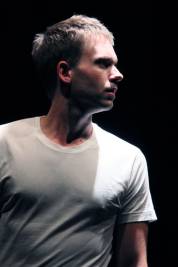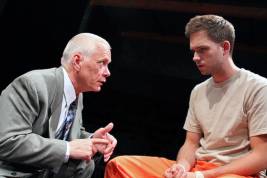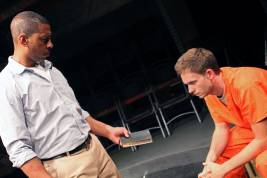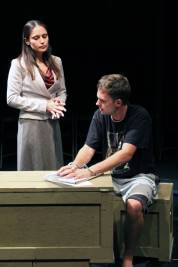
If protests against the war in Iraq have never come close to reaching the size or intensity of those of the Vietnam War era, one need merely compare the military demographics of troops serving in the Iraqi desert with those of soldiers sent to fight in the jungles of Southeast Asia. Whereas the pre-1973 military draft affected all but the wealthiest of Americans more or less equally, these days we have an all-volunteer Army, few of whose members have likely chosen a soldier’s life over a university degree or a white collar job. In fact, as Bill Cain’s Nine Circles makes abundantly clear, with soldiers like Pvt. Daniel Reeves in uniform, our military may well be scraping the very bottom of the barrel in recruiting new grunts. If not for Cain’s searing, probing, heart-rending look at Pvt. Reeves wounded soul, few among us would give much of a damn whether he lived his soldier’s life or got sent home in a body bag.
Following much lauded engagements in San Francisco and Boston, Nine Circles now gets its first Los Angeles production, fortuitously the very first to star Patrick J. Adams, the brilliant young USC grad whose work in Cain’s Equivocation at the Geffen won him a 2008-2009 StageSceneLA Scenie Award for Best Performance By A Featured Actor, that alone reason enough not to miss this riveting, thought-provoking, gut-wrenching evening of theater, though far from the only one.
As might be guessed, Cain’s latest play gets its title from Dante’s Nine Circles Of Hell, and not coincidentally is divided into nine scenes, or “circles,” each of which features Adams’ Pvt. Reeves and one of three superb actors in an array of supporting roles.
In the First Circle, we witness nineteen-year-old Daniel receiving an Honorable Discharge under protest, though it is not until later that we learn why the Army has sent him home after a mere eight months of military service. Far more significantly, in Circle #2, Daniel wakes up a year later in a holding cell, believing himself to be under arrest for drunk driving only to find out that he is accused of war atrocities which carry with them a possible sentence of death.
Circles Three to Nine give us insight into Daniel’s alleged crimes as various individuals confront him, each with his or her agenda. An Army lawyer (Paul Dillon) offers to defend Daniel if he will reenlist. A preacher (Joe Holt) seems more interested in Daniel’s relationship with Jesus. A psychiatrist (Arlene Santana) attempts to probe Daniel’s combat experiences for some clue as to what makes him tick.
The Daniel Reeves we get to know through these scenes is neither monster nor victim, but instead a deeply scarred individual whose inability to empathize made him at once absolutely right and absolutely wrong for a military life. Cain’s powerful script and Adams’ even more powerful performance allow us to understand and even sympathize with Daniel’s plight—even as the nature of his crimes makes us recoil in horror.
Nine Circles wears its anti-war sentiments on its sleeve, and unashamedly so. One of Daniel’s interrogators suggests that if the public understood just why this young man did what he is accused of doing, we would feel such compassion for our so-called enemies that war against them would prove impossible. Another interrogator raises the question of whether the deaths of three thousand Americans on September 11, 2001, justify the deaths of over five thousand U.S. soldiers since then.
With a brilliance belying his youth, director Justin Zsebe takes Cain’s already potent words and sets them on fire, aided and abetted by four exceptional performers and a thoroughly stunning production design, all of which result in as fine an intimate theater production as you’re likely to see all year.
Previous Nine Circles stagings have divvied out supporting roles between two Caucasian actors. At the Bootleg Theatre, there are three featured players, one African-American, one Hispanic, one white—a savvy decision which not only adds texture to this production but reflects military demographics with far greater accuracy. Dillon, Holt, and Santana each merit superlatives for the clearly delineated, richly drawn characters they bring to life. The tough, weathered Dillon, in particular, fits our image of a lifelong soldier to a T.
Still, there can be no Nine Circles without a supremely gifted actor at its core, and Adams is just such an actor, his 2005 professional debut in The Goat Or, Who Is Sylvia? at the Mark Taper Forum and his more recent dazzler at the Geffen making amply clear his prodigious gifts. Cain has written a complex, multilayered antihero. Adams makes him profoundly human, and in the ninth and final circles, alone on a bare stage dressed head to toe in white, the young actor does work so devastatingly accomplished and heart-wrenching that it puts him in serious contention for dramatic performance of the year.
Design-wise, Nine Circles could not be improved upon. Scenic designer Jason Adams has ever so ingeniously reconfigured the Bootleg into theater in the round, the audience seated on two levels, desert sand surrounding the circular center stage. Lap Chi Chu’s lighting design is his accustomed stunning best, and never more so than in the aforementioned final scene. Adam Phalen’s striking sound design ups the dramatic suspense significantly. Kathryn Poppen’s costumes are pitch-perfect creations, delineating both Daniel’s journey and the various characters who accompany him on it.
Amber Koehler is stage manager. Nine Circles is produced by Jessica Hanna, Alicia Adams, its young leading man, and the playwright.
With a flourishing film and television career, Patrick J. Adams could just as easily have stayed where the money is, on sound stages and location shoots. Instead, he has chosen a return to his stage roots, to the challenges and rewards of creating a performance nightly from start to finish and doing only feet from a living, breathing audience. Adams could not have picked a better project to spotlight his impressive gifts than Nine Circles, an all-around triumph for star, supporting players, director, and designers alike, and one that leaves Los Angeles theater (and L.A.) theatergoers all the richer for their efforts.
Bootleg Theatre, 2220 Beverly Blvd., Los Angeles.
www.bootlegtheatre.org
–Steven Stanley
October 27, 2011
Photos: Patti McGuire






 Since 2007, Steven Stanley's StageSceneLA.com has spotlighted the best in Southern California theater via reviews, interviews, and its annual StageSceneLA Scenies.
Since 2007, Steven Stanley's StageSceneLA.com has spotlighted the best in Southern California theater via reviews, interviews, and its annual StageSceneLA Scenies.







 COPYRIGHT 2024 STEVEN STANLEY :: DESIGN BY
COPYRIGHT 2024 STEVEN STANLEY :: DESIGN BY